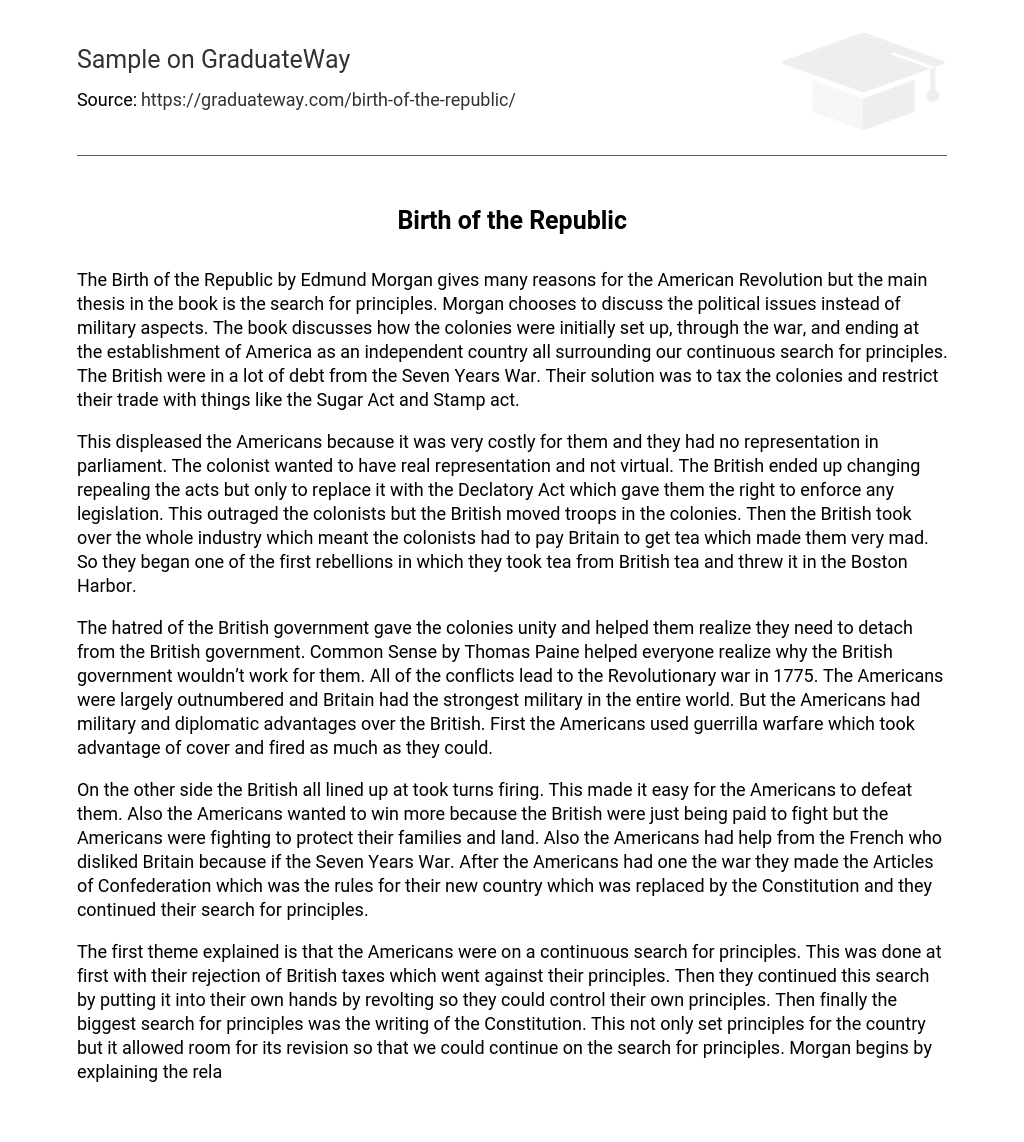The Birth of the Republic by Edmund Morgan explores the multitude of causes behind the American Revolution, with a primary focus on the quest for principles. Rather than delving into the military aspects, Morgan opts to examine the political issues at play. The book traverses the initial establishment of the colonies, delves into the war itself, and concludes with the formation of an independent America – all tied together by our unwavering search for principles. In response to their hefty debts from the Seven Years War, the British devised tactics such as taxing the colonies and imposing trade restrictions, exemplified by acts like the Sugar Act and Stamp Act.
The Americans were displeased with the situation because it was costly for them and they had no representation in parliament. The colonists desired genuine representation rather than a virtual one. The British eventually repealed the acts, but it was replaced with the Declatory Act which gave them the power to enforce any legislation. This action outraged the colonists, and in response, the British dispatched troops to the colonies. Furthermore, the British took control of the entire industry, resulting in the colonists having to pay Britain for tea, which infuriated them. Consequently, they initiated one of their first rebellions by seizing British tea and throwing it into the Boston Harbor.
The colonies’ unity and realization of the need to separate from the British government were fueled by their hatred towards it. Thomas Paine’s Common Sense further solidified their understanding of why the British government was not suitable for them. These various conflicts ultimately culminated in the Revolutionary War of 1775. Despite being vastly outnumbered and facing the strongest military in the world, the Americans possessed military and diplomatic advantages over the British. They employed guerrilla warfare tactics, taking advantage of cover and maximizing their firepower.
On the other hand, the British formed a line and took turns shooting, which made it easier for the Americans to defeat them. In addition, the Americans had more motivation to win because they were fighting to protect their families and land, while the British were only being paid to fight. Moreover, the Americans received support from the French, who disliked Britain because of the Seven Years War. After winning the war, the Americans established the Articles of Confederation as their new country’s governing rules. Eventually, they replaced these articles with the Constitution as they continued their pursuit of fundamental principles.
The main idea presented is that the Americans consistently pursued principles throughout their history. Initially, they protested against British taxes as it contradicted their principles. Subsequently, they rebelled in order to exercise control over their own principles. Ultimately, the writing of the Constitution marked the largest endeavor in search of principles, establishing guidelines for the nation while also allowing for future revisions to continue the quest for principles. Morgan commences by discussing the connection between the colonies and the English Parliament.
One main theme of the American Revolution was the concept of no taxation without representation. This belief held that the British should not have the ability to impose taxes on the colonists without providing them with representation in Parliament. It was this issue that played a significant role in motivating the revolution. According to historical records, “The Americans still felt most strongly the danger to their liberties from parliamentary taxation.” The British Parliament found itself burdened by substantial debt resulting from the Seven Years war and thus sought to levy taxes on the American colonies. However, all that the colonists desired was fair representation within Parliament. They acknowledged that Parliament had every right to implement duties and generate incidental revenue but firmly denied its authority to impose taxes specifically for generating revenue.
The Americans did not want to use their taxes for revenue, indicating their resistance. Despite being smaller and weaker, the colonists had an advantage in the war. Britain, being a superpower, was believed to have the strongest army at that time, but the book argues otherwise. The Americans possessed a stronger army due to their familiarity with the land and justified causes for fighting. Additionally, they received support from France. However, it is important to note that the assistance provided by France was limited to financial aid and supplies rather than direct military and naval involvement.
France offered assistance to the Americans without being prompted, providing them with resources, money, and boats that were vital in defeating Britain. The Constitution was seen as a solution to address the flaws of the British government. The author believed it served as a remedy for these issues by incorporating checks and balances to prevent an excessive concentration of power in one person and ensuring equal power and representation for each state. Moreover, it imposed limits on the authority of the Federal government.
Overall, the book was valuable as it offered a chronological account of our country’s birth, including the events leading to the revolution and American independence. The author effectively supported their claims with sufficient facts, making it a persuasive read. However, it is important to note that the book had biases. For example, the author portrayed the individuals involved as greedy bureaucrats who approached their task with malice, intensifying antagonism towards them and Parliament.
Customs officers in America were generally disliked due to their behavior. This book was an enjoyable read for me because the author effectively presented the various reasons for the revolution. Additionally, I appreciated that the author primarily focused on politics rather than using excessive military terminology when discussing the war. Despite its biased nature, I still found value in this book.





